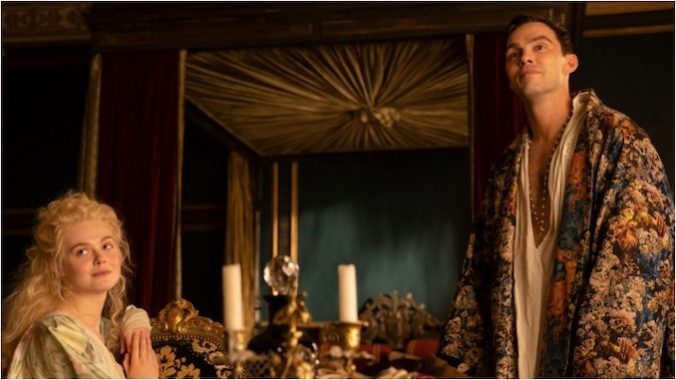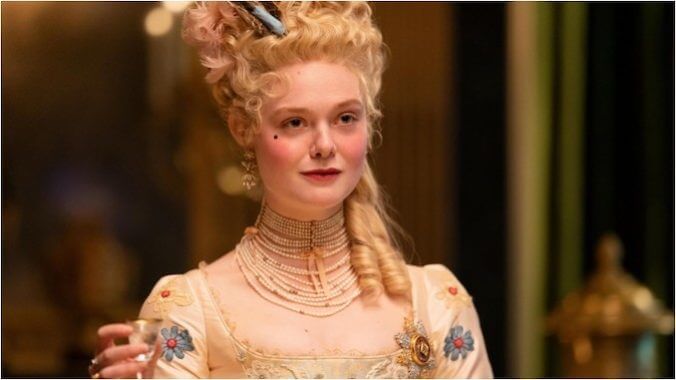In a Darker and More Mature Season 3, Hulu’s The Great Grows Up
Photo: Courtesy of Hulu TV Reviews The Great
[This review was originally published on May 5th, 2023.]
With its bright, colorful aesthetic, penchant for violence, and occasionally raunchy humor, it’s easy to underestimate Hulu’s The Great, which has quietly emerged as one of the best shows of the streaming era. A delightful blend of traditional period drama tropes and biting satire that somehow manages to be both heartfelt and hilarious, The Great’s candy-coated exterior has always been a colorful gloss on more complex truths—about history and who is allowed to tell it, about female power and accomplishment, and the eternal clash between oppressive institutions and those yearning to be free of them.
In its ten-episode third season, The Great embraces what is ostensibly its most bonkers premise yet: Rather than leave Catherine the Great (Elle Fanning) and her husband Peter (Nicholas Hoult) at odds with one another, it asks what might happen if they were actually on the same side—and in doing so finds its strongest, most human story yet, one that extends beyond its central royal couple in ways both large and small.

The Great Season 3 is many things. It is heartbreaking, hysterical, frustrating, and deeply, beautifully weird. It is a story about love and betrayal and how difficult it is to truly see someone for who they are, rather than who you wish they were. It’s a lesson about how vulnerable love inevitably leaves you, how much genuine work it takes to care about something beyond yourself, and how we’re all stories in the end, in some form or other. Perhaps that’s The Great’s greatest trick: this may be an occasionally true story that only sometimes follows the letter of law when it comes to historical fact. But its spirit—one that embraces the humanity and heart of its subject—is unmatched.
Where Seasons 1 and 2 were about exploring competing power dynamics, Season 3 begins with Catherine and Peter on somewhat more equal footing. Catherine’s failed murder attempt has forced the Empress to reckon with her true feelings for her husband and the two are now trying to move forward despite their mutual and repeated betrayals. Both are finally clear-eyed about their genuine love for one another, but less sure about what that actually means for either of them in real life. And as both Catherine and Peter are repeatedly forced to make hard choices between their marriage and the people (or rulers) they want to be, difficult and heartbreaking consequences ensue.
Fanning is tremendous throughout, portraying a slightly more world-weary Catherine who has not only seen the worst she herself is capable of—she did stab a man five times and take Peter back, again!—but who is beginning to understand that she cannot magically girlboss-gaslight-gatekeep Russia into becoming the progressive, egalitarian society of her dreams using the power of peppy speeches and cute outfits. The nobles don’t like her and the serfs don’t trust her; heck, she can’t even get anyone to agree to outlaw murder. Forced to question both her purpose and her heart at various points in the season, Fanning’s performance runs the gamut from determined confidence to unhinged mania and everything in between.
Her chemistry with Hoult is still some of the best on television, and the two are given much weightier and more complicated material to wrestle with this season. Can two such exceptional, opinionated people find a way to be happy together, without either of them making themselves less in favor of the other? Peter and Catherine’s arguments are sharp and cruel, their relationship sometimes has distinctly toxic edges, and they fight about everything from his public role in her court to parenting Paul. Yet, it’s clear that they also push one another toward being their best selves, and there’s never any reason to doubt the truth of their genuine affection. They love each other. They want their marriage to work. But is that enough?
That central question is woven throughout Season 3 in one form or another. Are Catherine’s good intentions for Russia enough reason for her to lead it? Is Peter’s love for his wife sufficient to make up for all the wrong he’s done?
Hoult gleefully embraces the softer, gentler side of Peter, who throws himself into domestic life: Carting little Paul around in a furry early Russian version of a Baby Bjorn, rejecting overt court politics for flirting with ambassadors’ wives, and engaging in various culinary experiences, such as creating his own line of flavored salts. Despite his occasional visions of his dead father, Peter the Great (Jason Isaacs) and lingering anxiety about living up to his legacy, this is the most mature, adult side of his character we’ve yet seen, who not only proves his love for Catherine but his own ability for real change. Don’t get me wrong, there are still plenty of scenes where Peter is violently chaotic—his staunch position that public duels are good, actually; an attempt to force his best friends to literally fight bears to prove their loyalty—but his growth is genuinely, almost heartbreakingly astonishing, especially given where he started in Season 1. (A low bar, I recognize, but still.)
The series’ supporting squad is as strong as ever: Georgina (Charity Wakefield) finally gets to do something more than simply bounce between Peter and her husband Grigor (Gwilym Lee), Marial (Phoebe Fox) continues to walk a fine line as both Catherine’s confidante and a would-be revolutionary, and her child-husband Maxim (Henry Meredith) steals every scene he is in. But, once again, it is Belinda Bromilow as Peter’s Aunt Elizabeth who quietly proves to be the most integral part of the show, and whose weird sexcapades and flighty attitude mask the heart of a lion (or a bear, it is Russia after all) and a spine of steel.
To be fair, Season 3 isn’t perfect, and many of its problems are essentially familiar ones. Episodes are long and sometimes overstuffed. The show often feels weirdly determined to hang on to ancillary characters who serve no real purpose (Freddie Fox and Grace Moloney’s deposed Swedish royals) or to force its central figures to retread the same character beats for no reason (it feels as though Catherine and Marial have the same argument roughly eight times). Some seemingly important subplots—including a key death—are treated with surprising brusqueness, and viewers who were hoping for more agency or interiority from some of the secondary denizens of Catherine’s court will likely wind up disappointed.
But, despite its flaws, The Great Season 3 is darker and emotionally richer than much of what has come before. It’s still loud and bombastic, full of ridiculous Russian traditions and sly anachronistic jokes. But it’s also sadder and more complicated, with a keener understanding of its own sharp edges, so often hidden by a pretty dress, a well-timed vodka shot, and a rousing “Huzzah!” Its final episodes—and the season does end at a place where it really feels that it could go either way in terms of continuing past this point—make the sort of risky, game-changing choices that signify a show that’s either about to wrap things up completely or head off in an entirely new direction. I’m not sure which path creator Tony McNamara will ultimately choose, but if this is where we leave the reign of Catherine, I’m still happy to have been part of her court.
All 10 episodes of The Great Season 3 premiere Friday, May 12th on Hulu.
Lacy Baugher Milas is the Books Editor at Paste Magazine, but loves nerding out about all sorts of pop culture. You can find her on Twitter @LacyMB.
For all the latest TV news, reviews, lists and features, follow @Paste_TV.